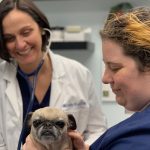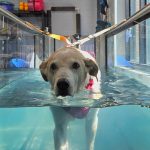ACL SURGERY FOR DOGS
Did you know your dog can suffer a CCL (ACL) tear just from normal activity? If a CCL tear or rupture happens to your pup, knee surgery will typically be required.
The instability from the tear can be very painful, thus causing the dog decreased mobility.
What is the Cruciate Ligament?
The cruciate ligament (referred to as CCL or ACL), is one of two bands that secure the thigh bone (femur) to the shin bone (tibia). In dogs, this ligament is attached to the front of the knee.
POTENTIAL CAUSES OF CCL INJURIES IN DOGS
Humans typically tear their ACL from some type of injury. Dogs, on the other hand, rupture or tear the ligaments mainly due to degeneration.
Additional factors may also support the reason why ACL tears happen in dogs:
- Weight issues (obese or overweight)
- Lack of exercise
- Genetics
- Immune disorders
- Size/breed
HOW DO I KNOW IF MY DOG HAS TORN HIS ACL?
This is one of the many instances where we wish our dogs could talk to us. However, if your pup is exhibiting some of the following behaviors, it’s best to consult your veterinarian about a potential ACL tear:
- Lameness after even the lightest activity
- Stiffness upon getting up
- Limping
- Avoiding walking on the leg
- Moaning or shaking from pain
To confirm diagnosis, your veterinarian will perform diagnostic testing. This will include a physical examination, and more than likely, some type of radiographs.
WHAT YOU NEED TO KNOW ABOUT DOG ACL SURGERY
ACL or CCL surgery is performed to repair the dog’s torn cranial cruciate ligament in the dog’s knee.
The surgery can be quite stressful on both the dog and dog owner. The recovery period can be long, and the cost, quite expensive.
It’s important to have a thorough discussion with your veterinarian prior to moving forward with the surgery. Quite often, you will be referred to a specialist. Part of the consultation should include:
- Is the surgery necessary?
- What is the cost?
- Which surgery will be best for my pup? (see types of procedures below)
- Recovery time
- Success rate
- Are there alternatives to surgery (inquire about cost, recovery and success rate)?
TYPES OF ACL SURGERY FOR DOGS
There is no “one surgery fits all” for ligament tears. The severity of the tear and size of the dog can be factors in determining the type of procedure warranted.
Below, is a brief description of each procedure:
Lateral Suture Technique (Extracasular Repair)
LST is more commonly performed on smaller breeds. Basically, a super tough suture is used in replacement of the torn ligament.
Tibial Plateau Leveling Osteotomy (TPLO)
TPLO is a surgical procedure that changes your pup’s physical form by cutting and rotating the tibia. Basically, TPLO surgery eliminates the need for the dog’s ACL.
TPLO is often referred to as the “bone-cutting” technique.
Statistics show that TPLO has the highest success rate for long-term functioning and shorter recovery periods.
Tibial Tuberosity Advancement (TTA)
Tibial Tuberosity Advancement is one of the newest, and more innovative approaches to CCL repair. This may be a great option for your larger pup.
This procedure cut’s the dog’s tibia and secures the modified angle of the joint with a steel or titanium implant.
POST SURGERY
The great news about ACL surgery in dogs is that the success rate is high. This means that after an eight to ten-week recovery period most dogs can resume normal activity. In fact, most dogs will start using the repaired leg within a few days after surgery.
However, running and jumping should be avoided during the recovery period to ensure the bone heals properly.
Strict crate rest for the first few weeks may be recommended to ensure healing of the incision.
Recovery will look different in every dog. The speed at which your pup recovers may be dependent on a number of factors:
- Type of repair surgery
- Your pup’s overall health
- Weight (overweight dogs may need more time to recover)
- Inflammation and/or arthritis
- How long the tear was present prior to surgery
Rehabilitation
Just like humans, dogs can benefit from post-surgery rehabilitation.
Healing Pups offers physical therapy for your pups. Our rehab specialists are trained in post-surgical care, range of motion exercises, weight management, laser therapy, massage, hydrotherapy and so much more!
If you decide not to move ahead with surger, Healing Pups can be a great alternative. Our team of professionals and veterinarians can work with you to develop a treatment plan specific for your pet’s needs.
Contact us today at 704-841-8884 for more information, or to set up a consultation!
DEVELOP A PLAN
Your dog’s ACL surgery is scheduled! Now what? This is the perfect time to create a plan for recovery.
A few things you may want to consider:
- Prepare a “recovery space.” This may be a confined space set for comfort and safety. Cover slippery floors with secured rugs.
- Order post-surgical needs (padded sling to aid walking, surgical suit, soft cone, and/or surgical sleeve).
- Consider a work from home schedule or secure a sitter for the first two weeks post-surgery
- Call to schedule a rebab consultation.
- Although it may be too late for this surgery, consider an insurance plan for the future.
Lastly, try not to panic. Your dog will recover much more quickly and easily in a stress-free environment. That means lots of love, hugs and maybe a cold ice pack, or two!
ALTERNATIVES TO ACL SURGERY
If you decide not to move forward with ACL surgery, talk to your veterinarian about a few non-surgical alternatives:
- Pain management
- Supplements
- Exercise plan
- Weight management
- Proliferation therapy (injections)
- Regenerative injection therapy











